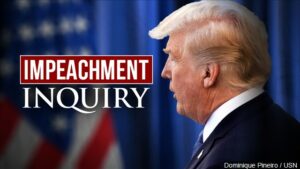The much-anticipated public hearing on the impeachment inquiry being conducted by the House Intelligence Committee produced a serious exercise in frustration and futility.
At least for me it did.
The Intel Committee took into the public domain what it had heard in private about whether Donald Trump sought a “favor” from Ukrainian government officials who could dig up some dirt on Joe Biden and his son, Hunter. The term of art has become “quid pro quo,” the Latin phrase that translates to “something for something,” or “this for that.”
It is the basis for the pending impeachment of the president of the United States.
White House chief of staff Mick Mulvaney acknowledged in the press briefing room that there was a quid pro quo, and then he told us to “get over it.”
Then came the testimony before the House panel from Gordon Sondland, the U.S. ambassador to the European Union, who said that “yes,” the president sought a quid pro quo. He heard him seek it in real time and told the committee what he heard from the president. He said everyone was “in the loop” regarding the quid pro quo.
The memo of Trump’s phone call with the Ukrainian president even mentions the “favor, though.”
Why, then, do Republicans on the House committee and others on Capitol Hill keep saying there was “no quid pro quo”? What are they not hearing? Did they cover their ears when Sondland testified to that knowledge at the House hearings? Did they not hear Mick Mulvaney’s assertion of a favor and his scolding us to “Get over it”?
I know these are rhetorical questions. They won’t produce any answers. They simply serve to symbolize the futility and frustration that this impeachment inquiry has produced … so far.
